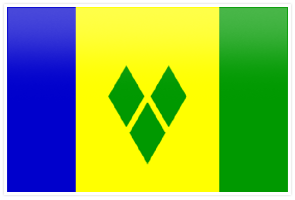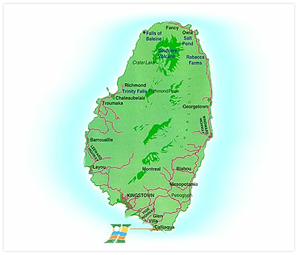St. Vincent

originally inhabited by Carib Indians, Europeans arrived on the islands of St Vincent & the Grenadines with Christopher Columbus in 1498.
Later, the islands were the center of a tussle between the British and the French for possession of the islands. The British, of course, took over in 1763 and the islands of St Vincent & the Grenadines remained under their dominion until they achieved freedom in 1979. The African population that is to be found on the islands are descendents of the slaves brought by the British to work in the sugarcane plantations.

Location of St Vincent
the islands of St Vincent & the Grenadines are a part of the Windward Islands located northeast of the South American continent. The islands are positioned midway between the Caribbean Sea and the northern region of the Atlantic Ocean. The island nation of Grenada is also a part of the group of islands to which the St Vincent & the Grenadines belong. Trinidad and Tobago lie south of the St Vincent & the Grenadines.
Physical Map of St Vincent
the archipelago of St Vincent & the Grenadines comprises of one main island, the St. Vincent Island, and a collection of some 600 islets or so called the Grenadines. The main Grenadines islands are Mayreau, Bequia, Petit Saint Vincent, Balliceau, Isle D'Quatre, Canouan, Mustique and Union Island. The island and the islets are volcanic in origin and so the terrain of the islands is mountainous and rugged. The soil being volcanic is extremely favorable and fertile. The highest point in the island is the Mt. Tobai.
Economy
the two chief resources of the St Vincent & the Grenadines - hydropower and arable land - indicate the course that the island-nation's economy takes. Agriculture and agricultural products dominate the country's economy. Of the crops, banana is the chief commodity that is also an important export item. Other agricultural products are spices, arrowroot, coconuts, taro, sweet potatoes and eddoes. The industries in the country includes packaging and processing of food, cement manufacture, furniture-making, garments and making-starch.
St. Vincent Offshore IBC
St. Vincent and the Grenadines is an independent English speaking nation, located in the Eastern Caribbean. IBC's incorporated in St. Vincent are completely free of all taxes for a period of 25 years. There are no exchange controls. There are no tax information exchange treaties with any country.
There is no requirement for books or audited reports to be presented to any authority.
The original bearer shares are required by law to be kept at the Registered Office. Copies are provided to the owners.
St. Vincent is an independent sovereign nation and will therefore not be affected by the impending UK/EU legislation impacting the British Dependant Territories, the Isle of Man and the Channel Islands.
To make this perfectly clear the "Confidential Relationships Preservation (International Finance) Act, 1996 specifically says "The Court hearing an application for directions under this section shall not allow the giving in evidence of confidential information in connection with the enforcement or prosecution, of the civil or criminal revenue or tax laws of another state, territory or other political jurisdiction".
Special features of St. Vincent International Business Companies (IBC's)
IBC's are permitted to have one director
Directors may be corporate entities or individuals
No requirements for a local director
No reporting requirements (annual returns or financial statements)
Filing of names of directors and/or shareholders is optional
Filing of By-laws is optional
No minimum or maximum capital requirements
Shares may be voting or non-voting, may be issued with or without par value, and multiple classes of shares are permitted Registered or Bearer shares may be issued
No limitations on where or how meetings may be held
Exemption from taxes




